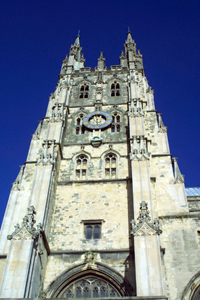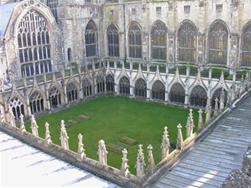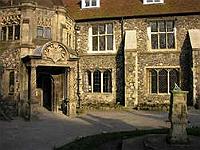Diocese of Canterbury
The Archbishop of Canterbury has many national and international responsibilities, but he is first and foremost the bishop in the Diocese of Canterbury The Archbishop's ministry as a bishop is rooted in the city of Canterbury as 'pastor of the cathedral and metropolitical church of Christ Canterbury' from which he oversees the life and witness of a diocese of 270 parishes: most of the county of Kent.
The Archbishop's ministry as a bishop is rooted in the city of Canterbury as 'pastor of the cathedral and metropolitical church of Christ Canterbury' from which he oversees the life and witness of a diocese of 270 parishes: most of the county of Kent.
The See of Canterbury — that is, the cathedral, parishes and other communities and institutions that make up the Diocese — is the 'mother' church (diocese) of the Church of England. As its bishop the Archbishop is therefore the 'metropolitan' bishop of the whole of the ecclesiastical 'province' of Canterbury: that is, the 30 diocesan sees of southern England and the Diocese in Europe, in relation to which he has a permanent authority of jurisdiction. There are many legal and pastoral responsibilities wrapped up in this role (and it is paralleled by a similar relationship between the Diocese and Archbishop of York and the other 12 dioceses of northern England).
The Archbishop of Canterbury is supported in his diocesan ministry by the Bishop of Dover, a supplementary or 'suffragan' bishop who acts as the Archbishop's delegate for the day to day running of diocesan affairs. Two further supplementary bishops, the Bishops of Richborough and Ebbsfleet, also work on the Archbishop's behalf to care for those parishes across the Province of Canterbury that do not accept the ministry of women priests.
For centuries archbishops have made their home at Lambeth Palace in London, and Archbishop Williams continues this tradition. However he is regularly resident in the Diocese.
The Archbishop's most focused periods of activity in the diocese occur at Christmas, Easter, and the Ordinations of deacons and priests for the Diocese (usually in late June). Whenever he can, the Archbishop enjoys spending time at weekends in visits to many of the 270 parishes within it. Like all bishops, when the Archbishop visits his parishes he would usually preside and preach at the Eucharist, and perhaps baptise and/or confirm, inaugurate the ministry of new pastor or share in a major event in the life of the community. These are also opportunities to support the ministry of his dicoesan clergy, and provide pastoral care to them.
This diocesan ministry is foundational to all other aspects of an Archbishop of Canterbury's national and global roles.
The Cathedral
The Cathedral and Metropolitical Church of Christ at Canterbury (to give it its full title) was founded by St Augustine and has undergone numerous modifications in the centuries since.
 As well as being the historic seat of the Archbishop of Canterbury and 'mother church' of the Diocese of Canterbury, it is also considered to be 'mother church' to the global Anglican Communion. Since the 12th century, following the murder of Archbishop St. Thomas Becket, the Cathedral has attracted pilgrims from across the globe. A central part of a World Heritage Site, the Cathedral remains a building of immense spiritual and historic significance. In 2006 an appeal was launched to raise the £50 million necessary to help fund much-needed repairs to the structure of this ancient building.
As well as being the historic seat of the Archbishop of Canterbury and 'mother church' of the Diocese of Canterbury, it is also considered to be 'mother church' to the global Anglican Communion. Since the 12th century, following the murder of Archbishop St. Thomas Becket, the Cathedral has attracted pilgrims from across the globe. A central part of a World Heritage Site, the Cathedral remains a building of immense spiritual and historic significance. In 2006 an appeal was launched to raise the £50 million necessary to help fund much-needed repairs to the structure of this ancient building.
The Old Palace
The Old Palace at Canterbury, within the precincts of the Cathedral, is the main residence of the Archbishop and his family when in Canterbury. Its history dates from the 11th century and it was home to many Archbishops until the Palace and the Estates were taken over by Parliament in 1647, following the English Civil War.
Its history dates from the 11th century and it was home to many Archbishops until the Palace and the Estates were taken over by Parliament in 1647, following the English Civil War.
Afterwards it remained unoccupied until the end of the 19th century, when Archbishop Frederick Temple opted to live there.
It has undergone many modifications and adjustments over the years, most recently reopening again in 2006 after a two -year process of much needed refurbishment.
Recent items relating to Canterbury are shown below:
April 2010

The Archbishop's Easter Sermon 2010 - Cross is a challenge to the world
4 April 2010
The Archbishop of Canterbury, Dr Rowan Williams, has used his Easter sermon to urge Christians to keep…
March 2010
Holy Week 2010
29 March 2010
The Archbishop gives a series of Holy Week Lectures entitled 'The beginning of the Gospel - reading Mark's…
December 2009

Archbishop of Canterbury's Christmas sermon 2009 - Christmas teaches us joy of dependence
25 December 2009
Society's rush to create independent citizens is crushing and narrowing children's experiences of childhood,…
October 2009

Archbishop welcomes new Bishop of Dover
5 October 2009
The Rt Rev Trevor Willmott has been confirmed as the new Bishop of Dover and Bishop in Canterbury. Bishop…
April 2009
Sermon celebrating Saint Anselm of Canterbury
23 April 2009
A sermon by the Archbishop of Canterbury at a Eucharist held at Canterbury Cathedral, attended by the…
Archbishop's Easter Sermon 2009 - 'Proof of the resurrection has to be lived, not argued'
12 April 2009
The Archbishop of Canterbury, Dr Rowan Williams, reminds Christians that belief in God is about living…

Archbishop's Lectures in Holy Week 2009
6 April 2009
The Archbishop gave a series of Holy Week Lectures 'Growing in Prayer: what the saints tell us about…
March 2008

Archbishop in Holy Week 2008
20 March 2008
On Thursday 20th March the Archbishop of Canterbury, Dr. Rowan Williams, observed the Passiontide celebrations…
December 2007
Archbishop's Christmas Sermon 2007
25 December 2007
The Archbishop of Canterbury, Dr Rowan Williams, delivered the following sermon at Canterbury Cathedral…
April 2007
Easter Day Sermon 2007 - Human Failure is Overcome by God's Love
8 April 2007
The Archbishop of Canterbury, Dr Rowan Williams, is to say that the whole weight of human failure cannot…
« previous 1 2 3 next »